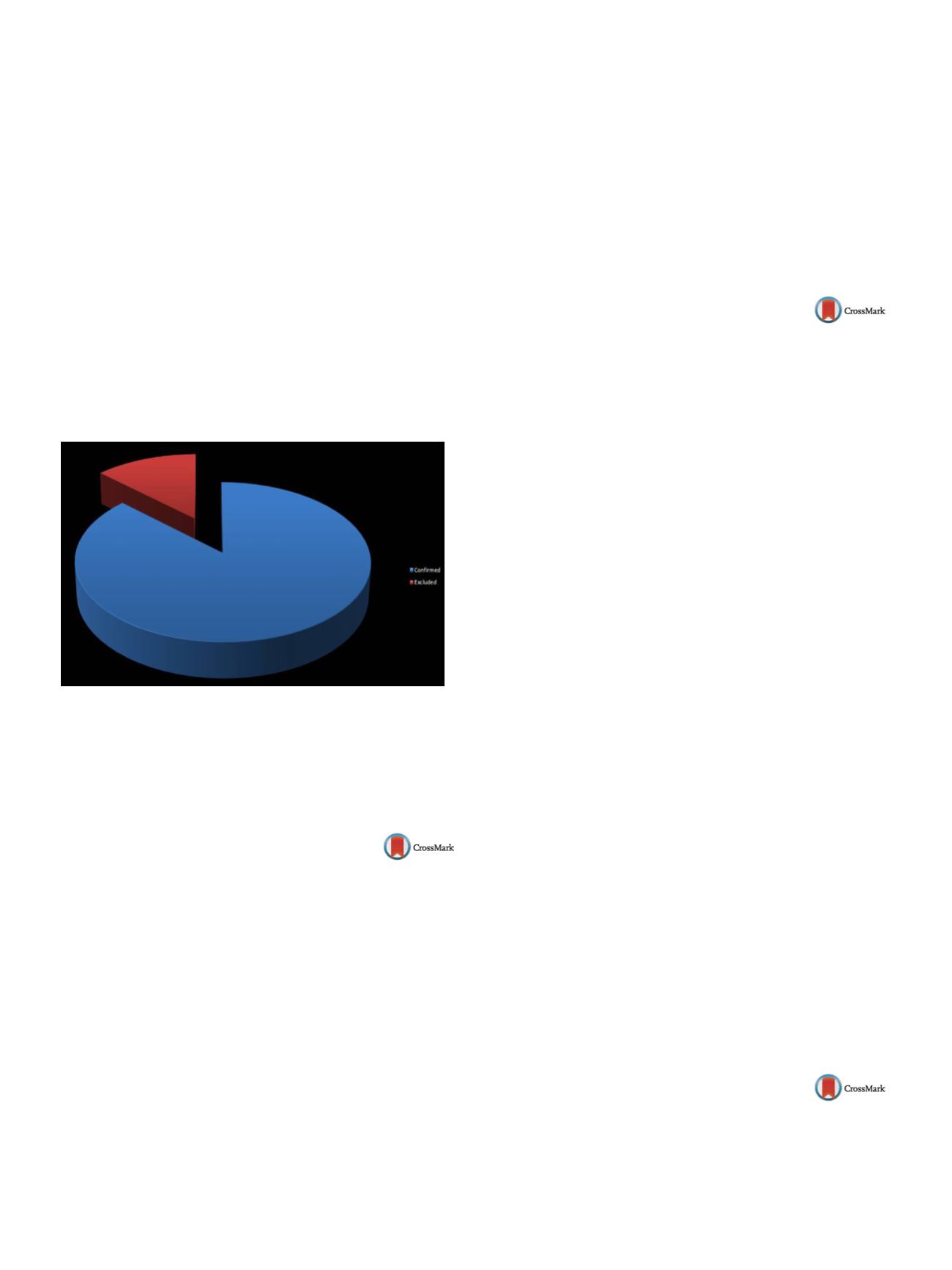

S460
25th European Congress of Psychiatry / European Psychiatry 41S (2017) S405–S464
– the restricted and repetitive interests and behaviors (RRIB)
dimension whereas PDD is diagnosed using impairments in three
dimensions.
All the studies indicate between 50 and 75% of individuals will
maintain diagnoses.
Objectives
The aim of the study is to quantify howmany individ-
uals with previous PDD diagnoses under DSM-IV-TR criteria would
maintain a diagnosis of ASD under DSM-5 criteria.
Methods
Our sample consists of 23 cases (21 males, 2 female)
related to the treatment Centre “Una breccia nel muro” of Rome
and Salerno. All the cases previous received a PDD diagnose accord-
ing to DSM-IV TR criteria. The mean age of cases was 7.7 years. All
the cases were diagnosed by our team according to DSM-5 crite-
ria, clinicians also used to make diagnoses: the Autism Diagnostic
Observation Schedule-2, the Autism Diagnostic Interview-Revised.
Results
Eighty-seven percent of cases with PDDwere classified as
ASD using DSM-5 criteria. Thirteen percent of cases, that previous
received anAsperger diagnose, didnotmeet theASDcriteria
( Fig. 1 ).Conclusions
DSM-5 criteria may easily exclude cases with high
functioning from ASD because they tend to be atypical for ASD
according to this study.
Fig. 1
Autism spectrum disorder according to DSM-5.
Disclosure of interest
The authors have not supplied their decla-
ration of competing interest.
http://dx.doi.org/10.1016/j.eurpsy.2017.01.504EV0176
Pattern of online technology and its
impact on productivity at workplace
H. Gupta
Role of online technology and social networking site at workplace,
ACAMH&NS – CCRAS, Bangalore, India
Background
Internet use has affected the pattern of working style
at the workplace. Recent years have seen an increased use of online
activities (especially pornography/gaming) at the workplace. It has
been shown to affect productivity at the workplace. There is a
dearth of literature from the Indian context in this area.
Aim
This study was conducted to explore the pattern of pornog-
raphy use and gaming at the workplace and its dysfunctions.
Setting and design
The present study was a cross-sectional
prospective study.
Materials and methods
The objective of the study was to assess
the pattern of pornography use at the workplace. Five hundred
employees having experience of internet use for more than a
year of various government/private sector organizations in Ben-
galuru were assessed using background data sheet, DSM-5 criteria,
internet addiction test and pornography addiction screening
instrument. Userswhowere unwilling to participatewere excluded
from the study.
Results
Seven to 9% reported preference for Internet to work,
meals, personal hygiene, sleep, and interaction with family mem-
bers and effects on productivity. Three to 4% have excessive use of
pornography and game.
Conclusions
The present study has implications for evolving
psychoeducational modules for the promotion of healthy use of
technology.
Disclosure of interest
The author has not supplied his declaration
of competing interest.
http://dx.doi.org/10.1016/j.eurpsy.2017.01.505EV0177
Mental Health Europe’s “beyond the
bio-medical paradigm task force”
issues on ICD-10
P. Kinderman
1 ,∗
, P. Pini
2, S. Wooley
31
University of Liverpool, Psychology, Health and Society, Liverpool,
United Kingdom
2
Mental Health Europe, Beyond the Biomedical Paradigm Taskforce,
Brussels, Belgium
3
Mental Health Europe, Expert by Experience & Beyond the
Biomedical Paradigm Taskforce, Brussels, Belgium
∗
Corresponding author.
Introduction
Recent developments in psychiatric diagnosis risk
downgrading psychological and social aspects of personal recov-
ery and marginalise the individual needs and aspirations of people,
considered in their local context. The publication of the fifth edition
of theDiagnostic and StatisticalManual forMental HealthDisorders
(DSM-5) by the American Psychiatric Association (APA) prompted
MHE to establish the Beyond the Biomedical Paradigm Task Force
(BBPtf) to investigate, debate and report on these issues.
Objectives
Mental Health Europe (MHE) – along with others both
within and outside mainstream psychiatry – has noted with con-
cern the increasing dominance of a biological approach to mental
health problems. We see a risk of diagnoses being misused when
they become part of a complex managerial health system respon-
ding mainly to the economic and issues of safety or social control.
This kind of misuse could breach the principles of the UN CRPD.
MHE welcomes the role of the WHO in coordinating internation-
ally appropriate classification systems. However, wewant to ensure
that systems based on biomedical, economic andmanagerial issues
are balanced with systems based on knowledge of personal expe-
riences, life stories and direct relationships, which have proven
outcomes and which respect human rights and dignity.
Aims
This workshop will explore the complex philosophical
issues associated with psychiatric diagnosis and, in particular, the
ICD-10 revision process.
Disclosure of interest
I am President of the British Psychological
Society and a member of both Mental Health Europe’s “Beyond the
Bio-Medical Paradigm Task Force” and the Council for Evidence
Based Psychiatry. I am currently in receipt of funding from the
National Institute for Health Research (NIHR) and the Economic
and Social Research Council (ESRC), and I have previously received
funding from a variety of sources.
The others authors have not supplied their declaration of compet-
ing interest.
http://dx.doi.org/10.1016/j.eurpsy.2017.01.506EV0178
Vintage mode: Expansive paraphrenia
R. Landera Rodríguez
1 ,∗
, M. Gómez Revuelta
2,
M. Juncal Ruíz
1, G. Pardo de Santayanda Jenaro
1,
L. Sánchez Blanco
1, O. Porta Olivares
1, M. Fernández Rodríguez
3,
E. López García
1, R. Medina Blanco
1, R. Martín Gutiérrez
11
Hospital Universitario Marqués de Valdecilla, Psychiatry,
Santander, Spain


















